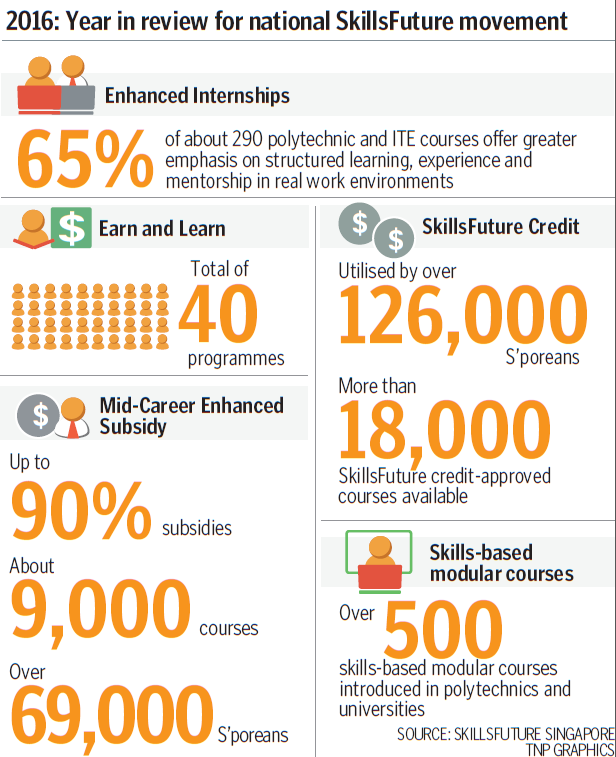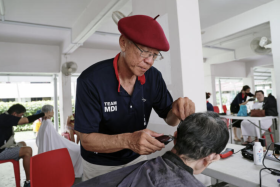SkillsFuture gets 'B' grade
Take-up rate rises, but scheme's chief executive says more needs to be done to change workers' mindset
In an effort to get Singaporeans up to speed in a world with constant disruptions, the Government funded nearly 1 million - 920,000 - training places last year. This is up from 830,000 in 2015.
Some 380,000 people attended training in courses as varied as pastry-making and computer coding, up from 350,000 in 2015.
But even as more Singaporeans heeded the call to undergo skills mastery and lifelong learning, mindset change does not come easily, observed SkillsFuture Singapore (SSG) chief executive Ng Cher Pong.
Have Singaporeans' attitudes towards the perennial need to master new skills really changed, he wondered in an interview with the media last Friday, where he shared an update on the progress of the national SkillsFuture movement.
"Mindset change is not easy to measure, and it certainly won't change overnight," he said. "Thus, the priority going forward would be to continue finding ways to drive a mindset change among Singaporeans.
"We don't want to be blindly chasing numbers... we don't want to just see numbers going up but (where) at the back of it, the mindsets haven't really changed."
Mr Ng said more details on engaging companies and individuals will be revealed soon.
SkillsFuture was launched over two years ago as part of a nationwide drive to encourage Singaporeans to continue upgrading their skills, regardless of where they started from.
Mr Ng gives the scheme a decent 'B' grade, if numbers alone told of its progress.
BUSY YEAR
Last year was a busy one for the national drive as the SkillsFuture Credit scheme, which gives every Singaporean aged 25 and older $500 credit to pay for skills courses, was rolled out.
It was introduced last January for about 2.5 million people.
More than 126,000 people, or about 5 per cent of those eligible, used it in the scheme's first year.
Mr Ng said "there is really no rush to use it", explaining that the credit does not expire and will be topped up at intervals. He urged Singaporeans to think carefully and not spend the credits on any course that comes to mind.
Over 500 modular courses have been introduced at the polytechnics and universities. These bite-sized courses, aimed at working adults, may even be "stackable" towards qualifications like degrees, Mr Ng said.
All Institute of Technical Education (ITE) and polytechnic courses are also on track to have their internship programmes enhanced by 2020.
These longer and more structured internships have clear learning outcomes and better mentorship, and are part of full-time diploma courses, Nitec, or Higher Nitec courses.
At the end of last year, two-thirds of about 290 polytechnic and ITE courses had enhanced their internship programmes.
Going ahead, some initiatives under SkillsFuture will be tweaked, said Mr Ng.
In the second quarter of this year, an online portal will be launched to help people plan for their education and training needs.
More modular courses will be rolled out with a greater push for more workplace and online learning opportunities.
SSG will also step up advisory services to help Singaporeans reach their potential.
Mr Ng said more will be done to engage individuals and firms, particularly the small and medium-sized enterprises.
Skills training: Info-comm courses most popular
Information and Communications was the most popular area of training among Singaporeans who used their SkillsFuture credits last year.
SkillsFuture courses are aimed at improving the skills of Singaporeans, and the take-up rate had a good spread across ages, recently released data shows.
Under the scheme, locals aged 25 and above were given $500 to pay for courses to improve their skills.

Get The New Paper on your phone with the free TNP app. Download from the Apple App Store or Google Play Store now


